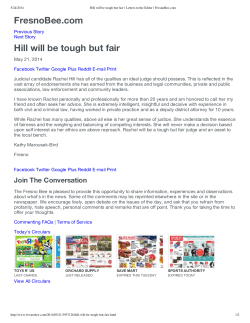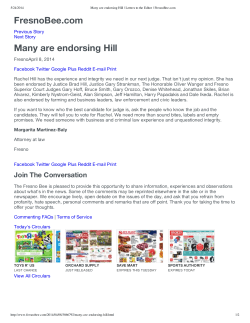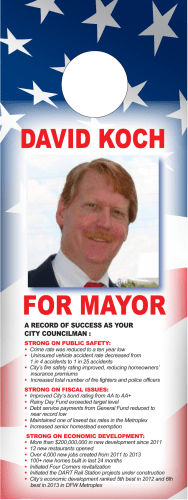
How to use Twitter, Facebook and Linked-In etc. to look
Social Media How to use Twitter, Facebook and Linked-In etc. to look for Jobs CC 3 Careers Centre © All rights reserved. No part of this publication may be reproduced, stored in a retrieval system, or transmitted, in any form or by any means, electronic, mechanical, photocopying, recording, or otherwise, without permission in writing from Edge Hill Careers Centre. Katharine McKinnon Employer Liaison Officer September 2013 Information obtained from the National Association of Student Employment Services (NASES) – 2012 Conference How To Use Facebook, Twitter and LinkedIn to Find a Job Why use social media? http://www.youtube.com/watch?v=ZQzsQkMFgHE Social media has is playing a vital role in boosting job search. Are you too benefiting from the popular social networking tools that have become a rage these days? Well, not only jobseekers but employers as well are garnering the benefits of social media for finding suitable candidates. Among other social media platforms, Facebook, Twitter and LinkedIn are the three most popular social networking websites that you can use to boost your job searching process. To make the most of these social networking tools, you need to be informed of the strategic ways for networking your way into a job or career of your interest. To find out why you should use Social Media to find a job have a look at this on You tube: http://www.youtube.com/watch?v=7iyzZoYBzNU Given below are some important tips on how to use social media for maximum benefit in your job search. Have a look. Let People Know You Are Searching for a Job It is a good idea to keep people in your network informed that you are looking for a job. It’s even better to let them know what type of job you are looking for. Whether you are using Facebook, Twitter or LinkedIn, tell people that you in search of a job position. If you keep them informed, they will keep you in mind and tell you as soon as a new position opens up. The job information that you get from your contacts can really boost your job search. Don’t Be Afraid of Networking with Friends on Facebook As compared to social media websites like Twitter and LinkedIn, Facebook happens to be more powerful when it comes to connecting with friends, coworkers and colleagues. Friends that know you on Facebook will be more helpful in finding you a job you are looking for or providing you with some valuable job related information. Spend some good networking with friends on Facebook. Make Your Facebook Profile Private The profile information that you fill out on Facebook is visible to everyone by default. If you don’t want employers to see your personal updates, you can set your profile to private. All you need to do is go to ‘Account’, click Privacy Settings and choose ‘Friends Only’. In this way, only those with who you are friends on Facebook will be able to see your personal updates and profile information. Search for Information about Hiring/Recruiting Managers These days almost every large employer is on Facebook, Twitter and LinkedIn. To boost your job hunting, you can first find information about the employers you have targeted. Smart employers will certainly keep their Facebook profile private. However, you can search for the information on other social networking websites and be informed about the new job openings coming up. In addition, you can dig out more valuable details about your targeted employers. Hyperlink Your CV Also remember to add the link to your personal profile on Twitter and LinkedIn. This helps employers to find your contact information if they are willing to get in touch with you. Don’t add a link to your Facebook profile, as it is private available only to your friends. Keeping profile information on Facebook private also shows employers that you are internet savvy. Many employers appreciate this skill. Create Facebook Lists Facebook allows users to create multiple lists, according to individual requirements. So you can create separate lists for friends and professional contacts. In this way, your professional contacts will have access to only that information that you want them to see. To create a new list on Facebook, you can go to Account, then Friends and then click Create a New List. Facebook allows you to set your privacy settings according to your requirements. This is a good strategy to be adopted by jobseekers in search of jobs. Get Found on Google If you want employers to find relevant information when they Google your name, you need to be active on all the above mentioned social media websites including Facebook, Twitter and LinkedIn. Fill out your profile information on all these sites carefully including the industry-related keywords as well. If you have a completely filled out job profile on these sites, employers will find your profile information in the top Google rankings. So, if you haven’t yet created your profiles on popular social media sites, go and create the same now. At the same time be active on the networks and spend some good time connecting with your network of friends for maximum job search benefits. 3 Ways to Use Twitter to Find a Job or Change Careers If your job search has stalled, or if you’re looking to switch it up and change careers entirely, chances are there’s a job out there for you on Twitter — if you know how and where to look. Even in this economy, and perhaps despite what you’ve heard on the nightly news, companies are hiring. Given the scale and cost effectiveness of social networking, more and more of those hiring companies are turning to Twitter to post job offers to a globally connected audience. There can be a lot of noise on Twitter, and not every job that’s posted will be right for you. Here are a few effective strategies to cut through the clutter and help you find that dream job or make that career change you’ve been waiting for. Search for Job-related Hashtags When you want your tweets to be seen by a wider audience on Twitter, one effective tactic is to include relevant hashtags in your tweets. That’s exactly what thousands of businesses, recruiters, and human-resources professionals are doing to make sure that their job offers are being seen by job seekers on Twitter. While it may be effective to search Twitter for relevant keywords or phrases, when you search for job-related hashtags you’ll find results from people who are actively looking to fill specific job openings. For example, one of the most popular and effective job seeker hashtags is #jobs. Organizations looking to find employees through Twitter will often use this hashtag because millions of people worldwide are searching on this hashtag 24 hours a day, 365 days a year. But that’s not the only effective job seeker hashtag. Try searching for hashtags like #hiring, or #hotjobs. You can also search for a job-related hashtag that includes the city in which you’re trying to find a job, like #ChicagoJobs or the industry you’re targeting, like #greenjobs. Try a few of your own permutations and see what results you get or try any of the top 100 job seeker hashtags as compiled by Career Rocketeer. Find Relevant People to Follow Another effective strategy for job seekers on Twitter is to find relevant accounts to follow such as companies you’d like to work for, professional placement agencies, online job listing sites, and so on. Do you know what type of companies are almost always in hiring mode? Start-up companies. Typically, the first order of business for any start-up is to find and hire qualified employees. Executives and staff are juggling many roles and may not have time to post help-wanted ads in the newspapers or on traditional job boards. Yet most start-up companies have very heavy presences on social media sites like Twitter. Use tools like Followerwonk to search Twitter bios for keywords like “startup” or “start-up.” When you find some start-ups that you think you might like to work for, follow the accounts, engage with the individuals doing the tweeting and when the time is right, make your pitch for employment. By definition, recruiters are always hiring too. You can easily find them by searching Twitter bios for keywords like “recruiter,” “staffing,” or “jobs.” Allow yourself to be creative with the keywords you use in Twitter bio searches; you’ll be amazed at how many people you’ll find who are relevant to your job search on Twitter. Network, Network, Network Twitter is a global social network. Don’t be afraid to expand your reach and follow people from anywhere and everywhere and from a variety of different backgrounds. Even if you’re interacting with someone from the other side of the globe, you never know which networks and resources that person is plugged into that may eventually help you with your job search. Of course, in order for people in your Twitter network to help you with your job search, they need to know that you’re actively looking for a job. You can let everyone know you’re in job search mode without necessarily including this information in your Twitter bio. Consider strategically inserting job related keywords, hashtags or phrases in your tweets, like “I’d love to work there” or “Anyone know if that company is hiring?” You can also network with like-minded people, who may be conducting their own job searches on Twitter and who have useful tips to share. One of the best ways to do this is to join Twitter chats like #JobHuntChat (Mondays — 10:00 pm ET) or #careerchat (Tuesdays — 1:00 pm ET) and simply jump in on the conversations and see where they lead. What does Edge Hill University’s Careers Centre offer students and graduates on social media? Our Facebook Page – “Edge Hill University Careers Centre” alerts students to part-time, casual and summer jobs, and graduates receive updates on the latest graduate jobs and schemes as and when they are advertised. All these opportunities are then advertised on our Vacancy System which is accessed via our website: www.edgehill.ac.uk/careers Follow us on Twitter: #EHU_Careers We are following over 500 employers and re-tweet their jobs. Be careful when composing your straplines on Twitter – we and therefore employers can see what you have written about yourselves. Believe me there have been some shockers How to use Facebook safely 10 Useful Tips to Personal Branding Success on Facebook Facebook is a place to interact with friends and family online. It's great for sharing sharing holiday snaps and video clips from your iPhone with your social circle. But there is more to Facebook, everyone from Goldman Sachs to Aaron Sorkin have realized this already. Why use Facebook for Personal Branding? Facebook has grown rapidly and now boasts some 600 million users globally. It has become a perfect platform for B2C (business to consumer) marketing, providing very targeted advertising opportunities based on user's likes and associations. Facebook is slowly moving towards a more professional and more career oriented service. They have recently introduced changes to personal profiles, giving more space to work and education information. Employers have checked applicants on Facebook for years, and most people Google you before meetings and your Facebook profile is likely to come up in searches. The way people use Facebook is different to that of two years ago. As you get friend requests from colleagues, customers and managers it's no longer strictly that social network. This means there is a case for branding oneself on Facebook just like we have always been doing on LinkedIn. So let's cut to the chase, how do you brand yourself on Facebook? 1. Set your vanity URL This is the first thing you will want to do to brand yourself, a vanity URL is basically your customized domain on Facebook. Instead of facebook.com/e2434h394oij you can get facebook.com/joeshmoe. Note that this new vanity URL will double as your Facebook email address, it will become joeshmoe (at) facebook.com. For the full details, check out How to set Your Facebook Vanity URL. 2. Check your privacy settings You will inevitably get friend requests from people you know professionally. Do you want these to see all your pictures and videos? If not, you can either choose to hide them from all users but a list that you set up. Or you can create different groups of friends which will have different access to your full profile. 3. Get a professional picture Will your Facebook picture pass the granny test? If not, upload the same one you use on LinkedIn. Some people will disagree with me on this and say that you should give visitors a unique Facebook experience - this is fine, just as long as it's not harmful to your brand. As a rule I would say the picture should be related to what type of person you are, being an authentic representation of your personal brand. If you are on the summit of Kilimanjaro in your profile picture, you had better be into your mountaineering in other words. 4. Fill in professional details You may have noticed that Facebook have 'promoted' professional information on personal profiles. The first text after your name is now about what you do for a living, perhaps because Facebook is gearing up to lock horns with its smaller professional rival LinkedIn. Put your company's name in the box and also try to state what you do (and not what you are). This means don't use a title like 'consultant' when you could say "managing large scale IT projects in the public sector" - which is a great deal clearer. And don't forget to put your schools and university on there as well as you can be found through these by old class mates (and that's hopefully a good thing). 5. Use BranchOut as the LinkedIn of Facebook Just to confuse you further, Facebook has a decent third part application called BranchOut which is all about professional networking on the Facebook platform. The benefit of BranchOut is that it allows you to search your contacts and their contacts based on company. Let's say you want to apply for a job at IBM, if you search for people in your network working for IBM they might be able to introduce you to the hiring manager. You can also recommend people on BranchOut and it's really like a Mini-Me version of LinkedIn. It's easy to get set up on BranchOut, all you do is importing your LinkedIn profile via the API and job's a good'n as they say. BranchOut hasn't really taken off yet but I notice more and more of my Facebook friends joining up. 6. Add your Blog RSS Nowadays every man and his dog have are blogging so I will assume you have a blog somewhere on the interwebs. This could be your own blog or one that you contribute to. To ensure that your friends and network see your updates you can plug in the Social RSS feed straight to your profile wall. This saves time having to share things manually and most people really enjoy reading your blog posts. 7. Useful status updates please Instead of sharing pictures of lol-cats, try to update your status with something useful and informative. This could be an article about your industry or business in general or a quote from someone like Richard Branson. You are really then showcasing what you read and where your interests lie; exactly what a potential customer or employer wants to see. Yes it could possibly bore your friends but they will forgive you for wanting to be a personal brand success. 8. Time to quit the games I would advise you drop Farmville, Mafia Wars and any other games you are active in on Facebook. The fact that you have time to play games every day on Facebook reflects poorly on your brand, you don't want a potential customer, employer, investor or partner to see this. Keep your games off Facebook to be safe. 9. Look into Groups and Pages Facebook Groups have fewer commercial features than Facebook Pages, but they are still very useful especially for online communities. Use a Facebook group to bring people together in your field, become a valuable contributor to that community and promote yourself and your company. Facebook Groups let you share pictures, video and links just like a normal account but it's all within the group. Another benefit of groups is that they allow you to email all group members very easily (this is not the case for Pages). Facebook Pages are for brands, ranging from Coca Cola to Rolls-Royce and even Brand You. These pages are similar to your normal profile but slightly less personal and better suited for a public persona and indeed a job seeker. You get full access to analytics tools on your Page, allowing you to see what people click on and how they interact. Another benefit is that your page will rank high for your name in search engines like Bing and Google and you can use it for your professional career, keeping your personal profile locked down. 10. Use Facebook events Just like LinkedIn, Facebook has a good events engine allowing you to write up and invite people. This means you can put on an industry event, how about a networking evening relevant to your field? Open it up to the public and you will find that new people join up and help out with the organization of things. By running events you will be positioned as a leader in your field which is obviously handy for your personal brand success. I hope you found this information useful – don’t be scared to use social media to find the job you are looking for! Honestly, using social media is the present and the future – and it does work! Like us on Facebook: “Edge Hill University Careers Centre” Follow us on Twitter: @EHU-Careers We are following over 500 employers – when they tweet their vacancies we retweet them to our followers, don’t miss out – follow us! CUSTOMER VIEWS Your views are important to us and help us to continually improve the quality of our services. We would appreciate it if you could complete this form and tell us what you thought of the information we’ve given you. Publication title : Will this publication help you? YES / NO Did you find the information easy to understand? YES / NO Was the publication interesting? YES / NO Did you like the design of the publication? YES / NO Do you have any other comments about Edge Hill University’s Careers Centre of the information we’ve given? Thank you for taking the time to complete this form. Please return it to the Careers Centre careers@edgehill.ac.uk Inclusive Learning It is Edge Hill University’s aim to make our services and provision accessible to all our users. If you need us to present our information in a different format (e.g.: electronic copy, large print), or need any other modifications to this publication, please contact The Careers Centre and we will do our best to accommodate your requirements. Edge Hill Careers Centre Contact Details: Tel: 01695 584866 Website; www.edgehill.ac.uk/careers Facebook – “Edge Hill University Careers Centre” Twitter –@ EHU_Careers Opening hours: Term-time: Monday – Friday 9.00 am – 5.00 pm
© Copyright 2025












